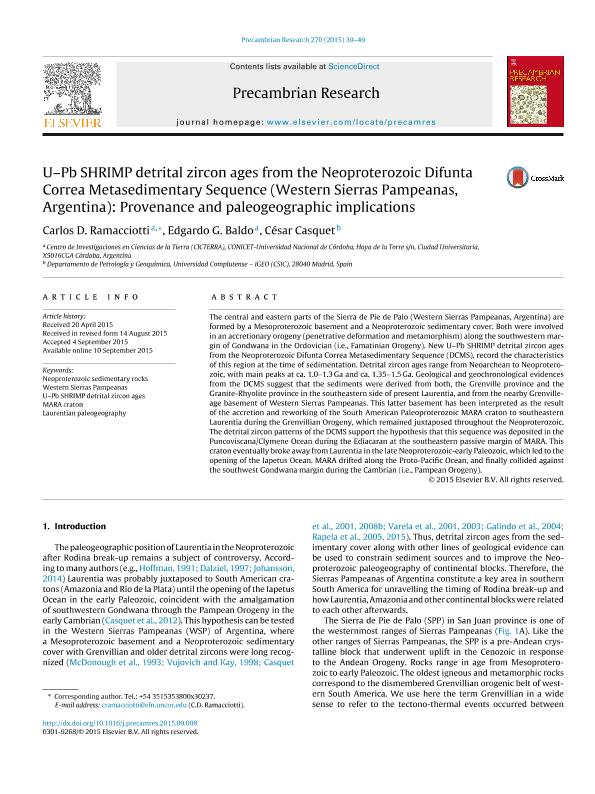Mostrar el registro sencillo del ítem
dc.contributor.author
Ramacciotti, Carlos Dino

dc.contributor.author
Baldo, Edgardo Gaspar Agustín

dc.contributor.author
Casquet, César

dc.date.available
2018-04-24T19:14:56Z
dc.date.issued
2015-11
dc.identifier.citation
Ramacciotti, Carlos Dino; Baldo, Edgardo Gaspar Agustín; Casquet, César; U–Pb SHRIMP detrital zircon ages from the Neoproterozoic Difunta Correa Metasedimentary Sequence (Western Sierras Pampeanas, Argentina): Provenance and paleogeographic implications; Elsevier Science; Precambrian Research; 270; 11-2015; 39-49
dc.identifier.issn
0301-9268
dc.identifier.uri
http://hdl.handle.net/11336/43312
dc.description.abstract
The central and eastern parts of the Sierra de Pie de Palo (Western Sierras Pampeanas, Argentina) areformed by a Mesoproterozoic basement and a Neoproterozoic sedimentary cover. Both were involvedin an accretionary orogeny (penetrative deformation and metamorphism) along the southwestern mar-gin of Gondwana in the Ordovician (i.e., Famatinian Orogeny). New U?Pb SHRIMP detrital zircon agesfrom the Neoproterozoic Difunta Correa Metasedimentary Sequence (DCMS), record the characteristicsof this region at the time of sedimentation. Detrital zircon ages range from Neoarchean to Neoprotero-zoic, with main peaks at ca. 1.0-1.3 Ga and ca. 1.35-1.5 Ga. Geological and geochronological evidencesfrom the DCMS suggest that the sediments were derived from both, the Grenville province and theGranite-Rhyolite province in the southeastern side of present Laurentia, and from the nearby Grenville-age basement of Western Sierras Pampeanas. This latter basement has been interpreted as the resultof the accretion and reworking of the South American Paleoproterozoic MARA craton to southeasternLaurentia during the Grenvillian Orogeny, which remained juxtaposed throughout the Neoproterozoic.The detrital zircon patterns of the DCMS support the hypothesis that this sequence was deposited in thePuncoviscana/Clymene Ocean during the Ediacaran at the southeastern passive margin of MARA. Thiscraton eventually broke away from Laurentia in the late Neoproterozoic-early Paleozoic, which led to theopening of the Iapetus Ocean. MARA drifted along the Proto-Pacific Ocean, and finally collided againstthe southwest Gondwana margin during the Cambrian (i.e., Pampean Orogeny).
dc.format
application/pdf
dc.language.iso
eng
dc.publisher
Elsevier Science

dc.rights
info:eu-repo/semantics/openAccess
dc.rights.uri
https://creativecommons.org/licenses/by-nc-sa/2.5/ar/
dc.subject
Neoproterozoic Sedimentary Rocks
dc.subject
Western Sierras Pampeanas
dc.subject
Mara Craton
dc.subject
Laurentian Paleogeography
dc.subject.classification
Meteorología y Ciencias Atmosféricas

dc.subject.classification
Ciencias de la Tierra y relacionadas con el Medio Ambiente

dc.subject.classification
CIENCIAS NATURALES Y EXACTAS

dc.title
U–Pb SHRIMP detrital zircon ages from the Neoproterozoic Difunta Correa Metasedimentary Sequence (Western Sierras Pampeanas, Argentina): Provenance and paleogeographic implications
dc.type
info:eu-repo/semantics/article
dc.type
info:ar-repo/semantics/artículo
dc.type
info:eu-repo/semantics/publishedVersion
dc.date.updated
2018-04-17T16:40:52Z
dc.journal.volume
270
dc.journal.pagination
39-49
dc.journal.pais
Países Bajos

dc.journal.ciudad
Amsterdam
dc.description.fil
Fil: Ramacciotti, Carlos Dino. Consejo Nacional de Investigaciones Científicas y Técnicas. Centro Científico Tecnológico Conicet - Córdoba. Centro de Investigaciones en Ciencias de la Tierra. Universidad Nacional de Córdoba. Facultad de Ciencias Exactas Físicas y Naturales. Centro de Investigaciones en Ciencias de la Tierra; Argentina
dc.description.fil
Fil: Baldo, Edgardo Gaspar Agustín. Consejo Nacional de Investigaciones Científicas y Técnicas. Centro Científico Tecnológico Conicet - Córdoba. Centro de Investigaciones en Ciencias de la Tierra. Universidad Nacional de Córdoba. Facultad de Ciencias Exactas Físicas y Naturales. Centro de Investigaciones en Ciencias de la Tierra; Argentina
dc.description.fil
Fil: Casquet, César. Universidad Complutense de Madrid; España
dc.journal.title
Precambrian Research

dc.relation.alternativeid
info:eu-repo/semantics/altIdentifier/url/https://www.sciencedirect.com/science/article/pii/S0301926815002946
dc.relation.alternativeid
info:eu-repo/semantics/altIdentifier/doi/https://doi.org/10.1016/j.precamres.2015.09.008
Archivos asociados
